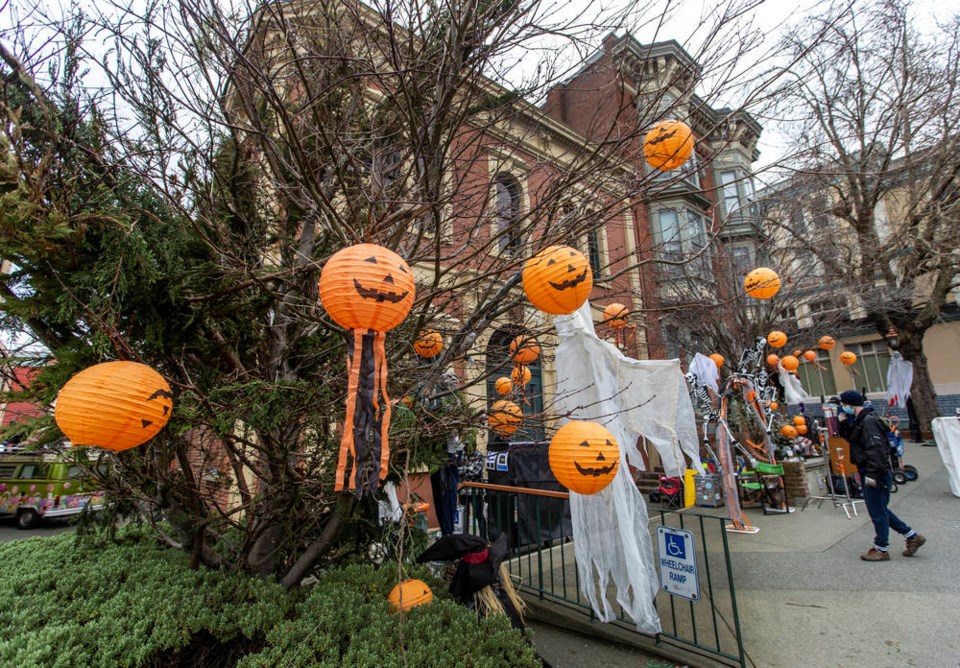The Victoria Film Commission is coming off a record year of industry spending in the capital region, but says it will be hard-pressed to repeat the performance in the face of declining grants from various levels of government.
The commission said it generated more than $50 million last year in economic spinoffs — including hotels and food services, wages for local workers and various permits and fees paid to municipalities — as crews worked on 25 movies, streaming series, documentaries and commercials.
But the grants the commission receives to run its office and promote the region are declining, seriously jeopardizing its ability to get the attention of movie producers and location managers, said film commissioner Kathleen Gilbert.
Gilbert said the commission normally runs on a $250,000 budget, which pays for three full-time staff, a bookkeeper and auditor, and covers insurance and rent. Last year, it ran on a shoestring of just under $155,000, as municipal funders removed grants-in-aid from their budgets and corporate sponsors retreated as the pandemic took hold.
The federal and provincial governments helped with wage and rent subsidies, said Gilbert, but it was a challenge to keep the doors and phone lines open, even after discretionary funding was cut.
The $50 million in spinoffs in 2020 was largely due to the commission’s outreach work in 2018 and 2019, said Gilbert.
Keeping Hollywood’s interest this year will take time and money, said commission board member Don Enright, which means looking at the film commission as an economic development agency, not a charity.
“We realize cities and municipalities have priorities and many organizations should be placed in a high priority for funding,” he said.
“But films bring money to the region — they pay wages that produce taxes, support businesses.”
Gilbert said the commission is grateful for funding partners who recognized the value of its work and continued to provide funding through “these difficult times,” adding it’s hopeful 2021 will see a return to full funding from all partners. “Without it, we cannot continue to offer the top-shelf service that resulted in a $50-million boost to the CRD economy.”
The province reduced its grant in 2020 by $15,000 to $46,0000. The commission said Saanich normally gives $35,700, but in 2020 only received $25,000.
Of the 12 municipalities that were asked for funding, four cut back or did not contribute at all.
If funding remains the same as in 2020, the commission will have to operate on $153,690.
Gilbert said the minimum budget, even after all non-essential items are removed, is $195,882, which means a $42,000 deficit.
Gilbert said the commission won’t know how much it will receive this year until June, as governments and companies finalize budgets.
But the cameras continue to roll and producers are still hunting for locations to match scripts.
One positive bit of news for the commission was Victoria being named one of the best cities to live and work as a movie maker by MovieMaker magazine, a top industry publication based in Los Angeles.
It ranked Victoria as No. 5 among small cities in North America, the only one in Canada, behind No. 1-ranked New Orleans, and then Santa Fe, New Mexico, Pittsburgh and Savannah, Georgia.
In the ranking, the magazine said that while Vancouver is a big-city alternative to Los Angeles and New York City, Victoria is “worth the trip:” “The Island, where Victoria is located, has locations that can double for everything from Central Park to English castles to the French Quarter to the Napa Valley. Professor Xavier’s School for Gifted Youngsters in Deadpool is really Hatley Castle, just outside Victoria, and Vancouver Island’s Highway 19 was the scene of a harrowing chase in Sonic the Hedgehog.”
The article notes “significant tax benefits” and a film commission that will “cheerfully direct you to qualified crew and production services, and your mood will be elevated by waking up each day to dreamy greenery and crashing waves.”
The major production in the region is a Netflix series called Maid, which has a crew of more than 300. Most other movie productions have crews of about 70.
Gilbert said hundreds of background performers, local actors and technical crews are added for each production.
“We have over 800 crew members on our crew database and most of them are working on shows right now,” she said. “There are also dozens of people who work on contract making, building or supplying set pieces, wardrobe and props to these shows.”
dkloster@timescolonist.com



